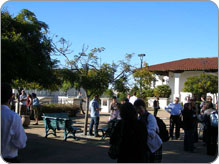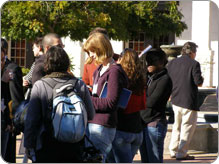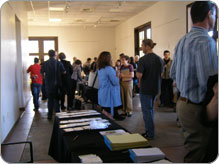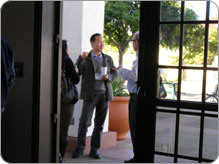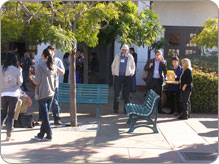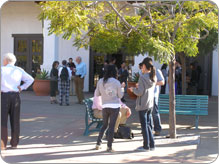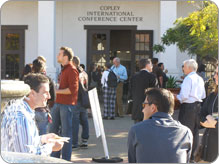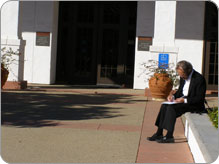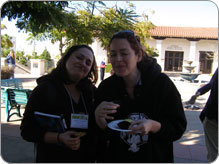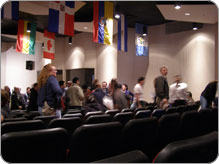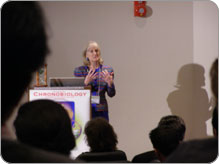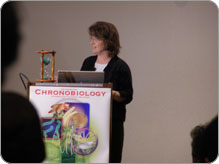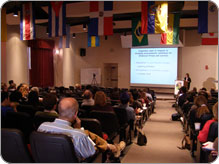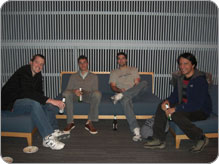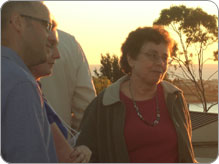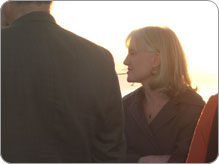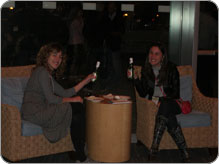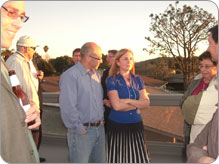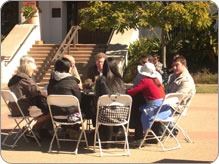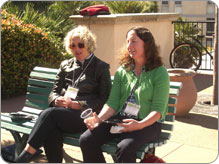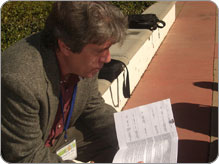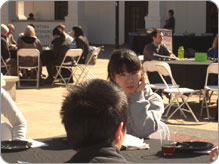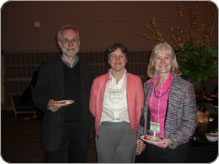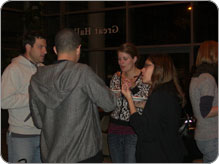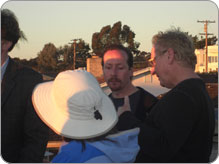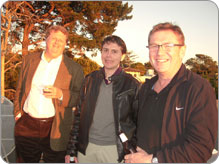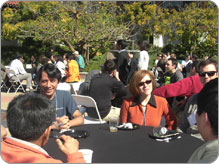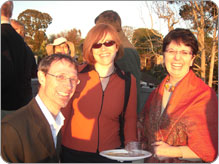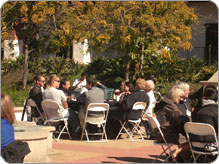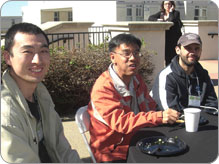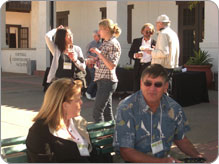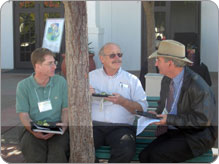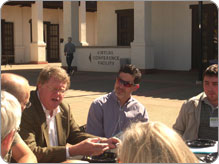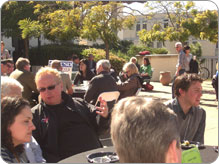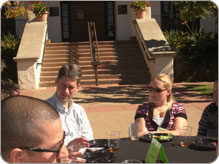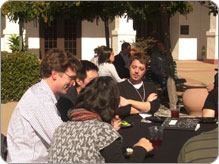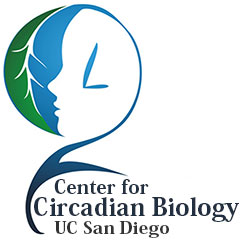CCB Symposium: From Cells to Clinic
UCSD's newly formed Center for Chronobiology (CCB) will host its 2nd annual chronobiology symposium to be held February 9-11, 2011. The theme for the symposium is "From Cells to Clinic."
We have invited a select, stellar group of chronobiologists from around the country and beyond, and a few local colleagues, to speak at this 2nd annual UCSD Chronobiology Symposium. We expect strong participation from our 28 PIs here in the CCB and their research personnel, and plan to accommodate a limited number of registrants from other institutions as well.
The aims of the conference are to:
- Provide participants with a comprehensive view of modern Chronobiology.
- Exchange a broad spectrum of ideas and techniques in Chronobiology.
- Promote interactions among the faculty and lab personnel of the UCSD Chronobiology Center, the invited speakers, and other participants.
- Further acquaint the speakers, their groups, and other registrants with the depth and breadth of Chronobiology research conducted at UCSD.
Schedule
WEDNESDAY - February 9, 2011
Session I: Cells & Circuits
Institute of the Americas Hojel Auditorium
1:30 pm - 4:30 pm
Moderator: Joanne Chory
Deborah Bell-Pedersen (Texas A&M University) - How fungi tell time: Circadian oscillators and rhythmic output pathways
Susan Golden (UCSD) - How bacteria tell time
Andrew Millar (University of Edinburgh) - The costs and advantages of complexity in biological networks
Satchin Panda (Salk Institute for Biological Studies & UCSD) - Circadian regulation of Chromatin modifications
THURSDAY - February 10, 2011
Session II: Pacemakers & Networks
Institute of the Americas Weaver Center
9:00 am - 12 noon
Moderator: Katja Lamia
Chris Colwell (UCLA) - Ionic mechanisms underlying circadian oscillations
Alec Davidson (Morehouse School of Medicine) - Spatiotemporal organization of the mouse SCN
John O'Neill (University of Cambridge) - Non-transcriptional mechanisms are sufficient to sustain circadian rhythms in eukaryotes
David Somers (Ohio State University) - Post-translation mechanisms in the plant circadian clock
BUFFET LUNCH
Institute of the Americas Plaza
12:00 pm - 1:00 pm
POSTER SESSION
Institute of the Americas Deutz Room & Arango Foyer
1:00 pm - 4:00 pm
FRIDAY - February 11, 2011
Session III: Inputs & Outputs
Institute of the Americas Hojel Auditorium
9:00 am - 12 noon
Moderator: William Joiner
Charles Allen (Oregon Health & Science University) - State dependence of the intracellular calcium signals generated in SCN neurons by excitatory neurotransmission
David Berson (Brown University) - What do ganglion-cell photoreceptors tell the clock?
Todd Holmes (UC Irvine) - CRYPTOCHROME is a blue light sensor that rapidly regulates neuronal firing rate
Terry Sejnowski (Salk Institute for Biological Studies & UCSD) - The inside story on human sleep spindles
BUFFET LUNCH
Institute of the Americas Plaza
12:00 pm - 1:30 pm
Session IV: From Lab to Clinic
Institute of the Americas Hojel Auditorium
1:30 pm - 4:30 pm
Moderator: Sara Mednick
Sonia Ancoli-Israel (UC San Diego) - Sleep and circadian rhythms in cancer patients
Derk-Jan Dijk (University of Surrey) - Individual differences in the homeostatic and circadian regulation of sleep and waking performance
Sarah Elsea (Virginia Commonwealth University) - Smith-Magenis syndrome: a model for circadian influence on development, behavior, and obesity
Kenneth Wright (University of Colorado at Boulder) - Pathophysiology of shift work disorder
Keynote Session & Dinner
UCSD Great Hall
5:00 pm - 8:00 pm
Keynote Speaker: Ronald Evans (Salk Institute for Biological Studies & UCSD) - Nuclear receptors and AMPK: Can super physiology be engineered?
Invited Speakers
| Alec Davidson Morehouse School of Medicine |
Kenneth Wright University of Colorado at Boulder |
| Andrew Millar University of Edinburgh |
Ronald Evans Salk Institute for Biological Studies & UC San Diego |
| Charles Allen Oregon Health & Science University |
Sarah Elsea Virginia Commonwealth University |
| Chris Colwell University of California, Los Angeles |
Satchin Panda Salk Institute for Biological Studies & UC San Diego |
| David Berson Brown University |
Sonia Ancoli-Israel UC San Diego |
| David Somers Ohio State University |
Susan Golden UC San Diego |
| Deborah Bell-Pedersen Texas A&M University |
Terry Sejnowski Salk Institute for Biological Studies & UC San Diego |
| Derk-Jan Dijk University of Surrey |
Todd Holmes UC Irvine |
| John O'Neill University of Cambridge |
Poster Session
There were 4 cash prizes of $150 each awarded to the 4 best posters.
Outstanding Poster Winner:
Tsuyoshi Hirota - UCSD, Steve Kay's lab
Title: Longdaysin: A Novel Modulator of Circadian Rhythms Identified by High-Throughput Chemical Screen
Best Poster Winners:
Juliana Bordowitz - UCSD, Susan Golden's lab
Title: Identifying Signaling Partners for the Synechococcus elongatus Circadian Input Kinase CikA
Yonggang Chang - UC Merced, Andy LiWang's lab
Title: Timekeeping Mechanism of a Circadian Oscillator
Luciano DiTacchio - Salk, Satchin Panda's lab
Title: JARID1a Co-activates CLOCK/BMAL1 and regulates the circadian oscillator
Directions
From Interstate 5 NORTH:
Exit at Genesee Avenue, turn right (west)
Turn left at North Torrey Pines Road (near the top of the hill)
Turn left on Pangea Drive
Pangea Parking structure will be on your left
From Interstate 5 SOUTH:
Exit at La Jolla Village Drive, turn left (west)
Continue straight onto North Torrey Pines Road
Turn right on Pangea Drive Pangea
Parking structure will be on your left
Campus Map:
Directions to the Institute of Americas on the UCSD campus
http://maps.ucsd.edu
Symposium Flyer
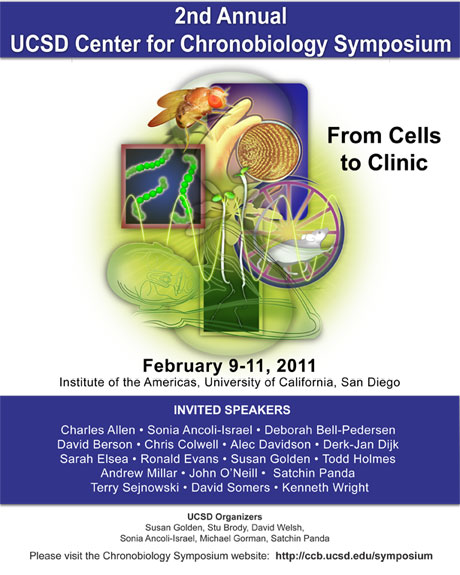
Please click here to download the symposium flyer.
Organizing Committee:
Susan Golden (Director, CCB)
Stu Brody (Founding Director, CCB)
David Welsh (Associate Director, CCB)
Sonia Ancoli-Israel (UCSD Department of Psychiatry)
Michael Gorman (UCSD Department of Psychology)
Satchin Panda (Salk Institute for Biological Studies & UCSD)
For additional information, please contact:
Terry Peters
Business Manager
Center for Chronobiology (CCB)
University of California, San Diego
Phone: (858) 534-7753
E-mail: tpeters@ucsd.edu




